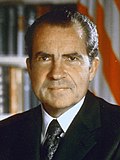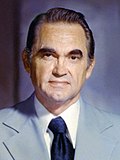| |||||||||||||||||||||||||||||||||
| |||||||||||||||||||||||||||||||||
 County Results
| |||||||||||||||||||||||||||||||||
| |||||||||||||||||||||||||||||||||
| Elections in Oregon |
|---|
 |
The 1968 United States presidential election in Oregon took place on November 5, 1968, as part of the 1968 United States presidential election. Voters chose six[2] representatives, or electors, to the Electoral College, who voted for president and vice president.
Oregon was won by former Vice President Richard Nixon (R–New York), with 49.83% of the popular vote, against Vice President Hubert Humphrey (D–Minnesota), with 43.78% of the popular vote. Independent candidate George Wallace finished with 6.06% of Oregon's popular vote.[3][4] As of 2020, this is the fifth and final time Oregon and neighboring Washington did not vote for the same presidential candidate.
Wallace did best in Eastern Oregon, along with Douglas and Josephine counties, primarily settled by people from the Ohio Valley/Border States. Wallace had little appeal in the primarily Yankee-settled Willamette Valley.[5]
Nixon's victory was the first of five consecutive Republican victories in the state, as Oregon would not vote for a Democratic candidate again until Michael Dukakis in 1988. Since then it has become a safe Democratic state.
- ^ "United States Presidential election of 1968 – Encyclopædia Britannica". Retrieved May 26, 2017.
- ^ "1968 Election for the Forty-Sixth Term (1969-73)". Retrieved May 26, 2017.
- ^ "1968 Presidential General Election Results – Oregon". Dave Leip’s U.S. Election Atlas. Retrieved May 26, 2017.
- ^ "The American Presidency Project – Election of 1968". Retrieved May 26, 2017.
- ^ Phillips, Kevin P.; The Emerging Republican Majority, p. 511 ISBN 978-0-691-16324-6
Cite error: There are <ref group=lower-alpha> tags or {{efn}} templates on this page, but the references will not show without a {{reflist|group=lower-alpha}} template or {{notelist}} template (see the help page).



